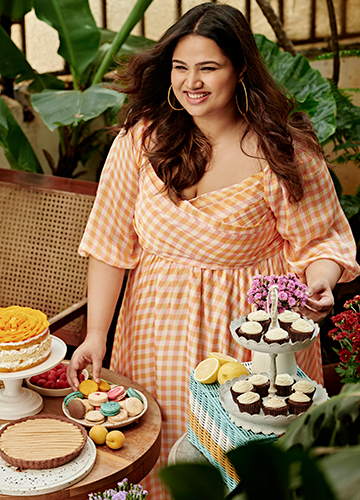In Henrik Ibsen’s famous play The Doll’s House, ‘macaroons’ symbolise defiance and independence. In the very first scene of the Norwegian play, which first premiered in Denmark on December 21, 1879, Torvald teasingly inquires if his wife Nora has been indulging her sweet tooth while out on Christmas shopping. Nora is first shown eating ‘macaroons’ before quickly erasing all traces of her guilty pleasure in the company of her authoritarian husband.
The ‘macaroons’ come as the first hint of Nora’s little rebellion against her suppressed existence in the “doll’s house”. While Ibsen’s ‘macaroons’ most likely did not look like the coloured sandwich cookies we see at French patisseries, he definitely was referring to a version of the dessert made with almond flour and meringue.
For Mumbai-based pastry chef Pooja Dhingra, often dubbed the “macaron queen of India”, the dainty confection also proved to be a consequential act of rebellion. After quitting law school, she opened India’s first macaron store—Le15, in 2010—as a 24-year-old when no one thought it had the commercial potential. With her Le15 brand of patisseries, the chef and businesswoman has charted an extraordinary course with a 30 under 30 achievers tag, six cookbooks, social media stardom and an online retail line of cookies, chocolate and pre-mixes with patrons in 90 cities across India. She was the first food influencer in India to hit the one million mark on Instagram. And she continues to craft the soft and crunchy French cookies in a panoply of colours.
There is a macaron ice cream sandwich on the way on store shelves. “This little bite of indulgence gives me so much joy. It’s light and perfect with my coffee. The process of making it is the most meditative thing. The egg-whites, colour, piping… all of it is therapeutic,” giggles an effervescent Dhingra on the phone, exuding the joie de vivre of her heart-warming profession.
In Coming Home, her most personal cookbook yet, the macaron maven takes a step back to rediscover the unvarnished joy of baking at home after the city favourite, Le15 Colaba, became a Covid-19 casualty and shut shop in March last year. “I still miss my cafe. Every aspect of it. Just going there, sitting with a cup of coffee and dessert was enough,” says the 35-year-old, even as she plans to unveil new shopfronts outside Mumbai in the coming year.
Not in the least perturbed by how so many other Indian pastry chefs have followed hard-selling macarons in her wake, Dhingra wields the same passion and optimism around making it more visible when she first started out. “I was everywhere when I started. I would have stalls at food markets, malls, supermarkets, give out free samples. Word of mouth is a better publicity than anything else,” says Dhingra, who has achieved great success with her “eggless” macarons. Her approach inspired French pastry chef and chocolatier, Pierre Hermé, to create his own vegan macarons. Hermé was adjudged the world’s best pastry chef back in 2016 by The World’s 50 Best Restaurants.
On her first weekend in Paris, where Dhingra had gone to train at the Le Cordon Bleu, a friend had gifted her a giant macaron cake from Hermé. The Ispahan had all the delicate flavours of rose, raspberry and litchi. “Every bite was like a party in my mouth,” writes Dhingra in the book. That must have been the proverbial penny drop moment. And in two years, Dhingra had her own macaron store.
In September this year, famed luxury French bakery and “macaron specialist”, Laduree, opened its first ever India store in Delhi’s Khan Market. The storied bakery—159-years-old, and world-famous for its double-decker macarons—is present in 25 countries. Its Delhi outpost occupies a three-storeyed building spread over 1,800 square feet. A cheerful Dhingra can hardly feel threatened. She sounds even more excited about how far India has traversed in embracing the petite concoction.
“I am a big fan of Laduree. I have their macaron keychain with my house keys on it. I always ate there when I was in Paris,” remembers Dhingra. “It is indicative of how big the Indian market is. If a luxury French patisserie has done their market research and opened in India, you obviously see potential. They kind of started macarons in France. They are like the inventors. It took me so long, so much effort to educate people on what macarons were. It is great that they are here. The pressure of educating people about the dessert will be off me,” says Dhingra who grew up in a family of aspiring bakers such as her aunt and her grandmother. Her own mother has a large collection of cookbooks, which Dhingra devours like storybooks. “My mother, too, wanted to go to Cordon Bleu and be a baker herself. She couldn’t do it; I fulfilled that dream for her,” says a beaming Dhingra.
If there is a dessert of the decade, what could be next after cupcakes, cheesecakes and the macaron? “It could be entremet-like glazed cakes. They are really picking up in India,” says Dhingra, referring to the multi-layered mousse cake with a shiny surface. For her part, Dhingra would love to revive the pineapple cream cake from her childhood. Currently obsessing over the butter cookies in Apple TV comedy-drama Ted Lasso, she rues the absence of standalone baking shows from India on OTT platforms. “I am waiting for someone to offer a show. I will do it tomorrow,” she says.


